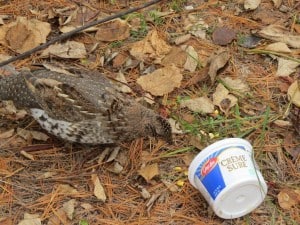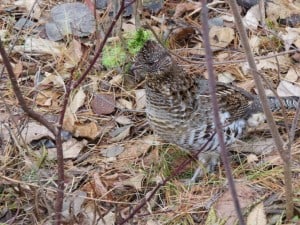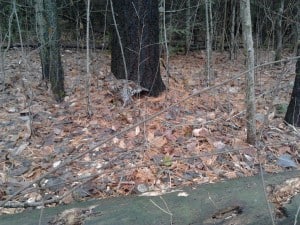I know nothing about Ruffled Grouse but thought you might like this story. Monday was a nice warm day and we worked outside all day decorating pots and putting up the Christmas lights. Around noon I wanted to go to clip some more branches that I see on my morning walks which are not on anyone’s property. Peter pulled the car into a clearing and I got out to go into the woods. I kept hearing this soft noise but couldn’t see anything until some movement caught my eye. It was a grouse. I spoke softly to it and it came closer and closer…so very camouflaged in the leaves. I didn’t make any sudden movements and continued to speak to it. When I decided to walk down into the woods further – about 30 feet – it followed me, and when I turned around to come back, it came back with me. We took some pics with Peter’s cell phone.
I went up today to the same spot with some corn, nuts, and sunflower seeds – not really knowing what to give it – and it was still there. It gladly ate the corn but left the food to follow me again and back.. I call it “Pretty Boy” but don’t know if its male or female Do you know anything about them? It seems so tame and friendly and now I want to go up to see him all the time. I feel so privileged. My husband is calling me the “bird whisperer!”
Jennie Gulliver
Note from Drew Monkman: For reasons that are not completely clear, some grouse lose or never develop a fear of humans and will walk right up to you. This seems to occur mostly in the fall. Fall is also called their “crazy season,” because they will often fly into all manner of objects: garage doors, windows, badminton nets, etc. These may be inexperienced young grouse leaving the family group to establish their own separate territory. Clearly, some are not the greatest navigators!
Here is an explanation for the tame behavior that I was able to find on-line. “Actually this is not as rare of an occurrence as you might think,” said Gary Zimmer, the Ruffed Grouse Society’s biologist in Wisconsin. “I get reports of ‘tame’ ruffed grouse each year across their range and have seen three individual birds exhibit this ‘strange’ behavior myself.” Several factors associated with grouse make this possible, he said:
• Male grouse in particular are mostly solitary individuals at least once they seek out and set up their small territory, which usually covers 6-12 acres.
• Ruffed grouse are notably territorial birds that challenge intruders.
• They often let other males know they “own” the area by doing their drumming sound at various times of the year.
• Hearing the drumming sound stimulates an established grouse to come out and protect its territory. Most of the “tame” birds have responded to a sound that is close to the drumming sound, such as the noise from an ATV, chain saw or old truck with a bad muffler.
“We assume the drumming-like noise elicits a response by the male grouse to go and confront this intruder,” Zimmer said. ”When he finds its not a competing grouse he checks things out. As long as he isn’t shot (and eaten), he might adopt a new buddy to escort around his territory.
“The birds I’ve encountered would only follow me to certain spots, which I suspected was the edge of their territories, and then they’d leave.
“Also most of the birds that exhibit this behavior have been males, and that would make sense as males are more territorial than females.”
Andy Weik, Ruffed Grouse Society regional wildlife biologist for New England, also said he hears numerous cases of ruffed grouse forming bonds with humans each year.
He suspects that the grouse drop their guard after the first territorial standoffs simply because humans walk upright, as do grouse.
“I haven’t noticed grouse acting this way toward four-legged animals, such as a fox or fisher – probably because it would end badly quickly for the grouse,” he said.


